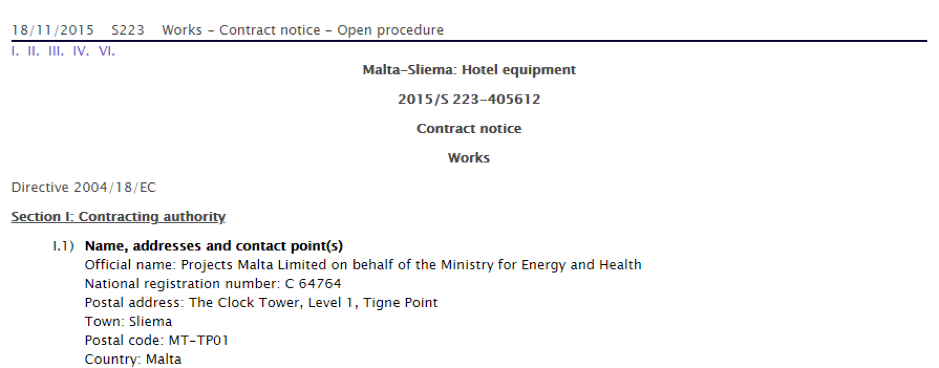Members of the real estate industry remain baffled by the government’s unusual guarantee of unobstructed sea views for the enormous DB group project in St George’s Bay, raising questions about the lengths the government went to accommodate the developer.
As citizens prepare to defend Pembroke and St Julian’s from being engulfed by an enormous development, industry insiders who spoke with The Shift offered insights into the details of a contract signed between the government and DB Group.
Lawyers and environmentalists pointed to a number of clauses and conditions agreed to by the government, which they described as proof of the “effective legal servitude in favour of DB Group”.
The contract between the government and DB Group, the company awarded the building of an enormous project in the former ITS site, was signed in 2017. Since the contract was made public, it has been subject to much scrutiny, as citizens and environmental groups cry foul over the proposed concession for the land.
The concession was also subject to a report by the National Auditor, following a request by then-leader of the Opposition Simon Busuttil in March 2017. Close to three years later, in March 2020, the NAO report was finally issued.
An industry insider who spoke with The Shift on the condition of anonymity, and who has been following the controversial project since the beginning, said there are items in the contract which were not mentioned in the NAO report but merit considerable attention, especially since the development remains an open wound for residents and environmentalists.
Specifically, the industry expert referred to the guarantee by the government not to obstruct or deliver any section of the foreshore, the area most influenced by high and low watermarks and breaking waves, to any party, other than DB group. Additionally, clause 13.4 of the contract guarantees that the project will have complete and unobstructed views.
Industry insiders noted that a guaranteed view would add significant value to the property: “I wonder if this has been considered in the price. Guaranteed views are a thing of serious luxury and rarity in Malta.”
It is ironic, the source added, to guarantee views for a company which will create such a large development that will, itself, be a major hindrance of views in the area.
The government also guaranteed, by contract, not to permit boat moorings in front of the coastal area given to the company.
“Our concern is that the land seems to have been valued by the square metre, but ignores these important elements,” industry insiders added.
Sources who spoke with The Shift said they have never seen such clauses in government contracts.
The land was sold to DB Group for a €60 million price tag but, as with every contract, the devil is in the details. This amount, which DB claims is the “highest price ever paid per square metre for a comparable project in the last 20 years” in the expensive advertising campaign for the project.
DB Group is actually paying €15 million, which amounts to the premium, plus an annual ground rent of around €392,930 for the hotel and some other areas. This price is calculated based on what DB Group builds, so if it downsizes the project it pays less.
These payment terms were generously spread out with the premium payable over seven years without interest and the annual ground rent reduced to a nominal €1,000 until DB Group’s architect certifies the entire development as completed.
The remainder of the “price” (amounting to just under €30 million) that DB Group is referring to would, in fact, be borne by people purchasing the luxury apartments through ground rent, conversion charges and redemption of the ground rent.

DB ran an expensive PR whitewashing campaign over its City Centre project.
Resonating concerns presented in a damning NAO report, sources who spoke with The Shift expressed their concern over the lack of clarity in the RfP (Request for Proposals).
“The RfP is very generic and gives way to bent interpretations. To start with, to pick up the details of the tender you need to fork out €50,000, even when you’d have no idea of what it entails.”
The questionable clarity of the RfP has been lambasted by the National Auditor in the lengthy report. Doubts were raised at the start, as the NAO notes, how Projects Malta failed to obtain the authorisation from the Contracts Department in November 2015, prior to issuing the RfP, thus casting “doubt on the regularity of the RfP”.
Reinforcing the claims made by the sources, in its report the NAO explained that since the government had intentionally classified the land transfer as a concession, rather than being processed in terms of the Disposal of Government Land Act, “it created additional obligations on the government, in terms of the Public Procurement Regulations”.
The NAO also lashed out at the way the RfP was advertised, describing it as “misleading” and anomalous. The NAO noted that the RfP was advertised as a call for hotel equipment, which limited potential competition, particularly from non-Maltese players.

Even the Malta Developers Association, home to property magnates, had expressed concern about how the call for offers was issued, highlighting shortcomings in the process.
One of the items which the vague RfP left out was the mention of guaranteed sea views.
The context in which this large tract of land was delivered to Silvio Debono is a troubling factor which cannot be ignored. As the NAO pointed out, the tender was issued by Projects Malta, the government’s privatisation arm, previously headed by Konrad Mizzi. The same disgraced Minister was responsible for the Vitals Global Healthcare privatisation agreement and the corrupt dealings on a wind farm in Montenegro.
As one source said, “Projects Malta seems to have been set up to bypass the regulatory authorities”.
When Mizzi was stripped of his energy portfolio, he was still in charge of Projects Malta. Simply put, the fact that Mizzi is involved in this agreement raises eyebrows, based upon his past connections to questionable dealings.
Additionally, The Shift had revealed that Planning Authority Board Member Matthew Pace, who voted in favour of the project, was involved as the owner of the real estate agency seeking investors and buyers for the project before any planning permit was issued, and the land was still owned by the public.
The story led the Planning Authority to have the DB Group’s permit revoked following action by NGOs. Now the battle rages on and residents of Pembroke, St Julians and Swieqi, thanks to further action by environmental groups, are adamant about saving their community from developers.
Ten NGOs and three local councils are contesting the project, as they feel that the minor and superficial changes made by DB provide little change to the plan.
No date for the hearing before the Planning Authority has as yet been set.













